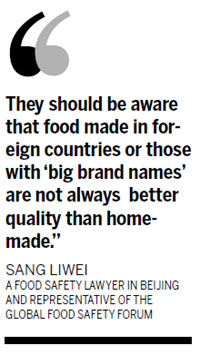China
Tainted dairy imports cause concern
By Qiu Bo (China Daily)
Updated: 2010-12-01 08:06
 |
Large Medium Small |

670 tons of imported milk found to be substandard
BEIJING - Experts have reminded consumers, many of whom have turned to overseas-made dairy products after the melamine scandal in domestic baby formulas, not to believe blindly in foreign dairy items after 670 tons of imported milk products were found to be substandard from March to August this year.
The General Administration of Quality Supervision, Inspection and Quarantine released a report over the weekend that revealed border quality checks had found the substandard imported dairy products. The amount made up 93.8 percent of the total unsafe imported food products found during that period.
Among the substandard dairy products seized at the border, about 70 percent were baby formulas, and most of them came from Oceania.
Excessive fungi and heavy metal contents were the major problems, according to the report.
The administration said all the problematic products had either been returned or destroyed. None had been allowed into the Chinese market.
Sang Liwei, a food safety lawyer in Beijing and representative of a nonprofit organization, the Global Food Safety Forum, said domestic consumers, especially dairy buyers, should adopt a sensible attitude toward overseas products, instead of blindly trusting them.
"They should be aware that food made in foreign countries or those with 'big brand names' are not always better quality than home-made," Sang said.
The country's milk products scandals in recent years have triggered a craze for overseas dairy products.
In 2008, baby formula tainted with melamine, an industrial chemical, killed at least six infants and caused kidney problems in more than 300,000 children across the country.
A year later, similarly tainted milk powder was found in Dongyuan-brand milk powder made in Northwest China's Qinghai province.
In November 2010, quality inspectors in Central China's Hunan province recalled 861 packages of contaminated dairy drinks, with each package containing 15 bottles. Further investigation traced the contamination to Dongyuan's case.
Zhou Siran, an industrial analyst at China Investment Consulting, said the increasing amount of substandard imported milk has been caused by the surge in imports of dairy products.
Zhou's company released a report this August showing that overseas milk powder accounted for more than 70 percent of China's market by the end of July.
The General Administration of Customs said on its website that milk powder imports exceeded 260,000 tons during the first seven months of this year, a 75 percent increase on the same period last year.
However, Song Kungang, chairman of the China Dairy Industry Association, said that the disqualified milk products rejected from March to August were only 0.2 percent of the total imported dairy products and that there was no need for consumers to panic.
Meanwhile, China has also tightened the management of the production of dairy products, particularly baby formulas.
In early November, the General Administration of Quality Supervision, Inspection and Quarantine released a new regulation demanding that dairy manufacturers reapply for their production authorization by the end of this year and saying that any company without a new license will be suspended from March 2011.
Wu Qinghai, chief of the food producing and supervision department of the administration, said in November that a panel of experts will start holding inspections on the current 1,600 dairy producers one by one in the next four months.
He said he believed a batch of unqualified producers will be expelled from the business.
China Daily